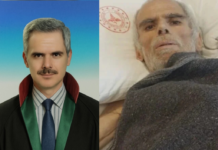The European Court of Human Rights (ECtHR) has declined to consider an application filed on behalf of a Turkish inmate suffering from cancer who had requested his release from prison to seek proper treatment, the Bianet news website reported.
Ali Osman Köse, 66, who is currently in western Turkey’s Tekirdağ Prison, suffers from renal cancer. He was diagnosed on February 27, 2021 and underwent surgery a few months later. The doctors advised that he be closely monitored in case the cancer spread to other parts of his body.
The ECtHR declined Köse’s appeal on the grounds that he had not exhausted domestic legal remedies.
The court also accepted the Turkish Ministry of Justice’s explanation that Köse had regular access to the hospital and good medical treatment. However Köse’s lawyer said his diagnosis and treatment had been delayed and in the meantime he had contracted COVID-19.
Although Köse had lost consciousness several times in prison, the Council of Forensic Medicine (ATK) decided he was fit to remain incarcerated. The hospital also issued a similar report, saying Köse’s cancer was not at risk of metastasizing. However, Köse’s lawyer argued that there were no oncologists on the board of doctors who issued the report.
As the number of sick prisoners dying in prison has increased, doubts about the credibility and independence of the council have grown, as the institution is affiliated with the Ministry of Justice.
Adding that it had become extremely difficult for Köse to take care of himself, eat and do daily chores, his lawyer said it was important for him to be released.
According to the Human Rights Association (İHD), as of June 2020 there were more than 1,605 sick inmates in Turkish prisons, approximately 600 of whom were critically ill. Although most of the seriously ill patients had forensic and medical reports deeming them unfit to remain in prison, they were not released. Authorities refuse to free them on the grounds that they pose a potential danger to society. In the first eight months of 2020, five critically ill prisoners passed away because they were not released in time to receive proper medical treatment.















